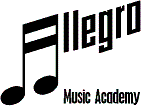
Policies
- Foundation
- Philosophy
- Homeschooling is an excellent way to learn.
- Music is an important part of the education process. It
provides camaraderie as well as a certain level of
competition. Music students learn to work with others for
a common purpose.
- The main purpose of music is enjoyment. The activities of
Allegro Music Academy are designed to be fun for the students,
the teacher, and for any audience we might choose to
entertain.
- Values
- Musicians need to be self-disciplined. Discipline must also
be maintained in the classroom in order for learning to take
place.
- High standards of musicianship are important, but it is much
more vital that we maintain high standards of character.
- Inclusion
- Allegro Music Academy is a secular school, though its
director is a man of high moral values and religious
convictions.
- Religion, politics, etc. are not part of the music curriculum.
- Students will not be turned away based on their own or their
parents' philosophies or lifestyles, as long as they are
within the boundaries of our civil laws.
- Students will not be given
preferential treatment based on their own or their
parents' philosophy of life.
- Music Selection
- Styles
- Music includes a vast number of styles. Selection will be
determined in part by the interest and taste of the students.
- A thorough education in music includes exploration of types
of music previously unfamiliar to the student. In most cases
this broadens the range of styles that the student appreciates
and enjoys.
- Appropriateness
- Allegro Music Academy will restrict the selection based on
staff's determination of its appropriateness.
- We will not sing lyrics that deal with topics such as sex,
alcohol or other drugs, violence toward others, disrespect
for authority, etc.
- We will not perform religious music.
- We have no policy against the inclusion of patriotic music.
- Any concerns on the part of any parent or guardian concerning
any selection should be discussed with staff.
- Security
- Parental Attendance
- An unfortunate reality of the dangerous world in which we
live makes it necessary for us to prevent not only
actual inappropriate behavior, but the allegation of it.
- At least one parent or adult guardian must be on site during
each class session or ensemble rehearsal. There are two
sitting
rooms adjacent to the rehearsal space; these offer a choice of
being able to maintain eye contact during a session or merely
being within earshot.
- For each class we will work out a schedule for which parents
are present for which sessions. In some cases one specific
adult may be able to be on site for every meeting of a given
class; in other cases the adults may wish to take turns
staying on site.
- Background Check
- The director of Allegro Music Academy has
more than once been the subject of a criminal background check
and security clearance performed by independent investigation
agencies. A copy of the latest report is available upon
request.
- A background check will be performed on any faculty added in
the future.
- Tuition
- Rates
- Fees for ensemble members vary according to group size and
experience level.
Smaller groups are charged a higher rate per student, as more
individual attention is possible. Students with more
experience are charged at a higher rate, because the benefit
they receive increases (as does the enjoyment in most cases).
- In every case, our ensemble fees are lower for one-hour
sessions than the "going rate" for half-hour private lessons.
- Fees for private lessons are static and fall in line with
what is offered by others in this area.
- Due Dates
- Fees for ensembles and other classes are due at the beginning
of the first meeting of each month.
- Fees for private lessons can be paid at the beginning of each
meeting.

